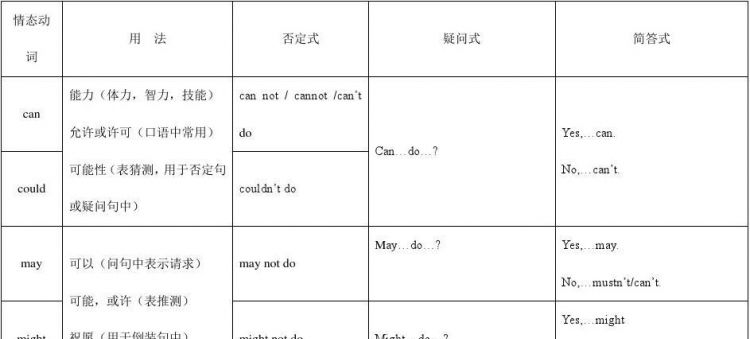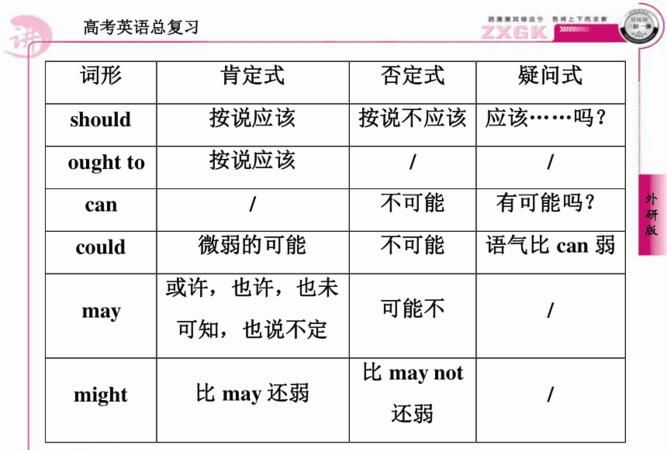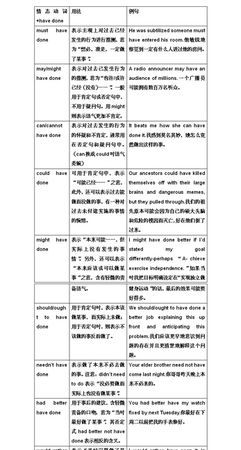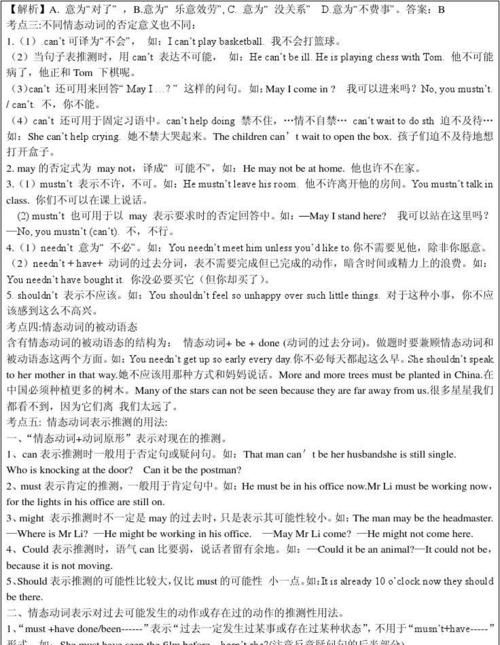本文目录
初中英语语法知识点总结大全详解
语法是初中生学习 英语 非常重要的一部分,下面我为大家总结了初中语法知识点,仅供大家参考。
初中英语一般过去时
1、定义 表示过去某一时间内发生的动作或存在的状态,可能是一次的,也可能是经常的,动作已完成.
2、构成 1) be – was,were 2) 实意动词用过去式来表示,没有人称和数的变化.
句型转换 1) was, were 提前或直接加 not 2) 实意动词加did或didn't(动词改为原形)
3、用法 1) 表示过去某一时间内发生的动作或存在的状态,常与表示过去的时间状语连用 yesterday , last Friday, in 1994, an hour ago, a moment ago, last November, before 1997, on December 26, 1976. yesterday morning.
2) 表示过去经常或反复发生的动作. When I was in the university, I did morning exercises every day.
3) had(have的过去式)当“有”讲时,构成疑问和否定有两种形式,其他词义同实意动词.
Did you have no friends? He hasn't enough time.
My father doesn't have lunch at factory. (不用 haven't) Did you have a good time?
初中英语必背语法知识
1、be late for„. „„迟到
Don’t be late for school.不要上学迟到。
2、play + 球类名词:打/踢„„球(注意:球类运动不用冠词)
play +the+ 乐器(西洋)
playping-pong/basketball/volleyball/tennis/soccer
3、sound
1)连系动词,“听起来”,后接形容词作表语。
That story sounds very interesting.那故事听起来很有趣。
2)名词“声音”(泛指自然界中的各种声音)。
The sound is too loud.声音太大了。
4、every day 每天
She plays sports every day. 她每天都做运动。
everyday日常的 everyday English 日常英语
初中英语疑问句知识点
疑问句的主要交际功能是提出问题,询问情况。分为一般疑问句、选择疑问句、特殊疑问句和反意疑问句。
1、一般疑问句通常用来询问一件事情是否属实。答句通常是“yes或no”。 句型一:Be +主语+ …?Are these books on the desk?这些书在桌子上吗?
句型二:Do / Does / Did + 主语 +谓语+…?Do you like English?你喜欢英语吗?
句型三:情态动词 + 主语 + 谓语 +…?
句型四:Have / Has + 主语 + 过去分词+…?
另外,还有以be动词、助动词或情态动词的否定缩写形式开头的一般疑问句,这种句子一般表示请求、惊讶和对事物的看法等,回答时所用的yes和no表达的意思和汉语的习惯不同。
2、特殊疑问句以疑问词开头,对句中某一成分提问的句子叫特殊疑问句。常用的疑问词有:what 、who 、whose 、which、 when、 where、 how 、why等。
以上就是我为大家总结的 初中 语法知识点,仅供参考,希望对大家有所帮助。

初中英语情态动词知识点总结
情态动词是用来表示意愿、主观想法。不能独立作为句子成分出现,通常是和谓语动词原形一起使用。常见的情态动词如,can能够,must必须,should应该,
need需要 等等。用法是:情态动词+动词原形

初中英语情态动词的用法归纳及总结
情态动词可以说是初中英语的必考内容之一,通常情况下情态动词会在完形填空、阅读理解中出现,当然, 作文 里大家也会适当运用情态动词,那么,什么是情态动词,情态动词又该怎么运用呢,下面就来具体了解一下。
初中英语情态动词的用法归纳
定义
情态动词表示说话人对某一动作或状态的态度,表示“可能”,“可以”,“需要”,“必须”,“应当”等意思。情态动词没有人称和数的变化,后面的动词要用原形。
情态动词的种类:
初中英语情态动词的用法归纳,情态动词用法有哪些
情态动词的常见用法:
1.can和could的用法
(1)can/could 表示“能力;许可;可能性”等。could 为 can 的过去式。如:Can I use your book?我可以用你的书吗?
(2)can 用在疑问句中,表示征求意见、请求许可,答语仍用 can; could 用在疑问句中,比can 更委婉、客气,是一种礼貌的说法,并不表示过去时态,答语用can,而不能用could。
Eg: -Could you tell me the way to the park?你能告诉我去公园的路吗?
-Sorry. I can't. I'm new here。不好意思,我不知道。我是新来的。
[注意]
①can 和could 只能用于现在时和过去时两种时态。
②另外, can't 可表示否定推测。
2.may和might的用法
may/might 意为“可以”,表示同意、许可或请求对方许可,也可表示祝愿。
might 是may 的过去式,有两种用法:一种表示过去式;一种表示虚拟语气,使语气更加委婉、客气,或表示可能性更小。
以may开头的一般疑问句,其否定回答用mustn't。
Eg: MayI use your book? 我可以用你用的书吗?
He might be alive. 他可能还活着。
【注意】
can和may都可以用来表示请求或允许,但may比can更正式,更客气。
3.must和should
(1)must意为“必须,应当”,含有一种命令的语气,比较生硬,不容商量。否定形式mustn't, 表示“不得”,“一定不要”。如:
Eg:You mustn't drive after drinking。你绝不能酒后驾车。
①must 与 have to 的区别: must 表示说话人的主观意愿;have to 表示客观需要。
②回答由must 引导的疑问句:
肯定回答:Yes, …must. 如:
-Must I go home now?
-Yes, you must.
否定回答:No,…needn't./No,…don't/doesn't have to.
Eg:-Must I go home now?
-No, you needn't. 。
③must 表示对事物的推测,意为“想必;一定”,只用于肯定句中;表“推测”时,情态动词与动词原形,(常为be动词)连用,
如:The man must be your teacher。那个人一定是你的老师。
(2)should意为“应当,应该”,表示建议或劝告,语气比较委婉,客气。否定形式为shouldn’t。
Eg: You should get up early.
You shouldn't eat too much sugar.
4.will和would
1)用于疑问句,表示说话人向对方提出请求或询问,用would比will更委婉,更客气。
如:Will you please open the window?
Would you like some coffee?
2) would表示建议“你愿意…吗”
-Would you like to go shopping with me?
-Yes, I’d love to. /I’d love to. But I’m busy now.
[注意区别]
①I’d like+n. … 我想要…(接名词)
如:I’d like some water.
②I’d like to + v. … 我想要做…(接动词原形)
如:I’d like to go with Tom.
5、shall用于第一人称 (I, we), 可以表示“将”和表示建议 “……好吗?”
eg: ①Where shall we have dinner?
②-Shall we go fishing? -
- All right. OK. Good idea.
情态动词的实际运用
一、考查can的用法
a.考查can表示能力的用法。
在这一用法中,can表示能力,意思是"能,会",其否定式can't表示"不能"。在过去时中用could和couldn't。例如:
1.-Where's Mr Lee? I have something unusual to tell him.
-You________find him. He________Japan. (2003黑龙江)
A. may not; has gone to B. may not; has been to
C. can't; has gone to D. can't; has been to
2.-Finish drawing a horse in ten minutes. OK?
-Sorry. It________in such a short time. (2003山东威海)
A. may do B. can't be done
C. must do D. needn't be done
3. I have my own room in my house, so I________do what I want in it. (2002江西)
A. must B. have to C. need to D. can
4.________you mend my car? I______not start it. (2002常德市)
A. Would; would B. Must; must C. Can; can D. May; may
5.________she ride when she was three years old?( 2002长沙市)
A. Can B. Could C. Need D. May
6. The boy________answer this kind of hard questions one year ago.(2002四川省)
A. can B. may C. could
b.考查can表示推测的用法。
在这一用法中,can意为"可能",表示客观可能性,常常用于疑问句和否定句中。例如:
7. Who is the man over there? Is it Mr Li?
-No, it________be him. Mr Li is much taller. (2003河北)
A. mustn't B. may not C. can't D. needn't
8. -Listen! Someone is singing in the next room. Who________it be? Is it Wei Fang?
-No. It________be her. She is at school now. (2002重庆市)
A. will; may not B. must; mustn't C. may; can't D. may; won't
9. -Is Mr Hu in the reading room?
-No, he________be there. He has gone to Tianjin. (2002新疆)
A. mustn't B. needn't C. won't D. can't
10. Class 3 won the football match! ________it be true?(2002广东)
A. May B. Must C. Will D. Can
c.考查can / could表示请求许可的用法?
在这一用法中,can和could都表示现在,用could比用can语气更加委婉客气,常用Could I / you...?句式,表示"我/你能……吗?"
若表示同意要用can,不用could?例如:
11.-Could I look at your pictures?
-Yes, of course you________. (2003武汉)
A. could B. can C. will D. might
12.________you pass me a pen? I'd like to write down the telephone number. (2002北京市海淀区)
A. Need B. Could C. Must D. Should
参考答案:1. C 2. B 3. D 4. C 5. B 6. C7. C 8. C 9. D 10. D
二、考查may的用法
a.考查may表示请求许可的用法
在这一用法中,may表示许可或征询对方许可,表示"可以"的意思,常常与第一人称I连用,构成May I...?句式,表示"我可以……吗?"肯定回答用Yes, you may.; Yes, please.等;否定回答用No, you can't.或No, you mustn't.,不用No, you may not.?例如:
25. -________I have your name, please?
-Yes, Michael. M-I-C-H-A-E-L. (2002北京市东城区)
A. Must B. Will C. May D. Need
26. -May I go to the cinema, dad?
-No, you________. You must finish your homework first. (2002浙江金华市)
A. mustn't B. won't C. don't D. needn't
27. -May I smoke here?
-________, you________. It can be dangerous. (2002滨州市)
A. Yes; can B. No; can't
C. Yes; may D. No, needn't
②测试may表示可能性的用法。
在这一用法中,may表示可能性,意思是"也许","可能",通常用于肯定句中。例如:
28. You________go and ask Meimei. She________know the answer. (2003天津)
A. must; can B. must; may
C. need; can D. can; may
29. Look out! The knife is very sharp. You________cut your finger. (2002宁夏)
A. need B. must C. should D. may
参考答案:25. C 26. A 27. B
初中英语情态动词的用法归纳相关 文章 :
1. 初中英语情态动词之shall和should的正确用法
2. 中考英语语法专题详解七:情态动词、系动词
3. 初中英语情态动词之 used to
4. 初中英语基础知识归纳总结
5. 初中英语语法知识归纳
6. 初中英语必须掌握的19个重点语法知识点
7. 情态动词should的用法总结
8. 初中英语动词的知识点总结
9. 初中英语语法知识点总结
10. 初中英语语法总结

初中英语情态动词知识点总结
情态动词有can (could), may (might), must, have to, shall (should, will (would), dare (dared), need (needed), ought to等。 情态动词无人称和数的变化;不能单独使用,必须与其后的动词原形构成谓语
一、 can, could
1) 表示能力(体力、知识、技能)。
Can you lift this heavy box?(体力)
Mary can speak three languages.(知识)
Can you skate?(技能)
此时可用be able to代替。Can只有一般现在时和一般过去式;而be able to则有更多的时态。
I’ll not be able to come this afternoon.
当表示“经过努力才得以做成功某事”时应用be able to,不能用Can。如:
He was able to go to the party yesterday evening in spite of the heavy rain.
2) 表示请求和允许。
-----Can I go now?
----- Yes, you can. / No, you can’t.
此时可与may互换。在疑问句中还可用could,
might代替,不是过去式,只是语气更委婉,不能用于肯定句和答语中。
---- Could I come to see you tomorrow?
---- Yes, you can. ( No, I’m afraid not. )
3) 表示客观可能性(客观原因形成的能力)。
They’ve changed the timetable, so we can go by bus instead.
This hall can hold 500 people at least.
4) 表示推测(惊讶、怀疑、不相信的态度),用于疑问句、否定句和感叹句中。
Can this be true?
This can’t be done by him.
How can this be true?
二、 may, might
1) 表示请求和允许。might比 may语气更委婉,而不是过去式。否定回答时可用can’t
或mustn’t,表示“不可以,禁止”。
----Might/ May I smoke in this room?
---- No, you mustn’t.
---- May/Might I take this book out of the room?
---- Yes, you can. (No, you can’t / mustn’t. )
用May I...?征徇对方许可时比较正式和客气,而用Can I...?在口语中更常见。
2)用于祈使句,表示祝愿。
May you succeed!
3) 表示推测、可能性(不用于疑问句)。
might不是过去式,它所表示的可能性比may小。
1.He may /might be very busy now.
2.Your mother may /might not know the truth.
三、 must, have to
1) 表示必须、必要。
You must come in time.
在回答引出的问句时,如果是否定的,不能用mustn’t(禁止,不准),而用needn’t, don’t have to(不必).
---- Must we hand in our exercise books today?
---- Yes, you must.
---- No, you don’t have to / you needn’t.
2) must是说话人的主观看法, 而have to则强调客观需要。Must只有一般现在时, have to 有更多的时态形式。
1. he play isn’t interesting, I really must go now.
2. I had to work when I was your age.
3) 表示推测、可能性(只用于肯定的陈述句)
1. You’re Tom’s good friend, so you must know what he likes best.
2. Your mother must be waiting for you now.
四、 dare, need
1) dare作情态动词用时, 常用于疑问句、否定句和条件从句中, 过去式形式为dared。
1. How dare you say I’m unfair?
2. He daren’t speak English before such a crowd, dare he?
3. If we dared not go there that day, we couldn’t get the beautiful flowers.
2) need 作情态动词用时, 常用于疑问句、否定句。在肯定句中一般用must, have to, ought to, should代替。
1.You needn’t come so early.
2. ---- Need I finish the work today?
---- Yes, you must. / No, you needn’t.
3) dare和 need作实义动词用时, 有人称、时态和数的变化。在肯定句中,dare后面常接带to的不定式。在疑问句和否定句中,dare后面可接带to或不带to的不定式。而need后面只能接带to的不定式。
1. I dare to swim across this river.
2. He doesn’t dare (to) answer.
3. He needs to finish his homework today.
五、 shall, should
1) shall 用于第一人称,征求对方的意见。
What shall we do this evening?
2) shall 用于第二、三人称,表示说话人给对方的命令、警告、允诺或威胁。
1. You shall fail if you don’t work hard.(警告)
2. He shall have the book when I finish it.(允诺)
3. He shall be punished.(威胁)
六、 will, would
1) 表示请求、建议等,would更委婉。
Will / Would you pass me the ball, please?
2) 表示意志、愿望和决心。
1. I will never do that again.
2. They asked him if he would go abroad.
3) would表示过去反复发生的动作或某种倾向。would表示过去习惯时比used to正式,且没有“现已无此习惯”的含义。
1. During the vacation, he would visit me every other day.
2. The wound would not heal.
4) 表示估计和猜想。
It would be about ten o’clock when she left home.
七、 should, ought to
1) should, ought to表示“应该”,ought to表示义务或责任,比should语气重。
1. I should help her because she is in trouble.
2. You ought to take care of the baby.
2) 表示劝告、建议和命令。should, ought to可通用,但在疑问句中常用should。
1. You should / ought to go to class right away.
2. Should I open the window?
3) 表示推测
should , ought to (客观推测), must(主观推测)。
1.He must be home by now. (断定他已到家)
2.He ought to/should be home by now.(不太肯定)
3. This is where the oil must be.(直爽)
4. This is where the oil ought to/should be.(含蓄)

以上就是关于初中情态动词语法知识点归纳 ,初中英语语法知识点总结大全详解的全部内容,以及初中情态动词语法知识点归纳 的相关内容,希望能够帮到您。
